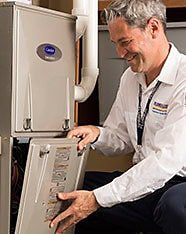Heat Pump vs. Furnace: Which Is Better for Your Denver Home?
If you’re looking to install a new heating system for your Denver home, you’re probably wondering which is more suitable for the area and climate: a gas furnace or a heat pump.
Well, in general a gas furnace is the most popular choice in the Denver area. But there are also plenty of Colorado homeowners who are happy with a heat pump.
When making your decision between the two heating systems, consider these 5 factors:
- Access to natural gas vs. an all-electric house
- Whether you currently have an air conditioner or not
- Cost
- Comfort
- Lifespan
We’ll take a closer look at these factors, and we’ll also discuss another option for Colorado homeowners: a dual fuel system.
Access to natural gas vs. an all-electric house
First off, if your home doesn’t have gas lines, the decision is made for you: you’re getting a heat pump.
Have solar power? If so, a heat pump is also an excellent option for you because these units cool and heat efficiently with electricity.
If you don’t have solar power and have access to both natural gas and electricity, then you’re still in the running for both types of heaters. So, let’s move on to another deciding factor: whether you already have an air conditioner or not.
Whether you currently have an AC or not
If you don’t currently have an air conditioner, a heat pump would be a great option since it doubles as a heater and an air conditioner.
On the other hand, if you already have an air conditioner for your home, you’d most likely want to choose a gas furnace.
Cost
Which is more expensive? A gas furnace or a heat pump? Well, two factors to consider when it comes to cost are:
- Initial, upfront costs (installation)
- Operating costs (electricity vs gas prices)
Let’s take a look at both...
Initial costs:
When comparing upfront pricing, heat pumps are slightly more expensive than a furnace.
But, keep in mind, that a heat pump works year-round as your air conditioner and your heater. And if you are a new homeowner without any HVAC system, buying one unit (heat pump) as opposed to a furnace and an air conditioner, saves you a lot more money in the long term.
Operating costs: electricity vs gas prices
In Denver, a gas furnace is cheaper to operate than a heat pump because gas prices are much lower in Colorado than in other states.
Even though a heat pump is designed to use less energy than other systems, Denver’s cold winters causes the heat pump to frequently run on “backup heating” (also called supplemental heating).
Backup heating is basically electric resistance heating, which is much more expensive than gas heating. So, a gas furnace is less expensive to run in the long-term and offers lower monthly heating costs than an electric heat pump (unless you’re on propane).
For more information on how a heat pump operates during Colorado’s cold winters, check out our blog, Do Heat Pumps Really Work in Cold Climates?
Comfort
During certain temperatures, a heat pump blows much cooler air than a gas furnace, which can make some people less comfortable.
A gas furnace usually puts out air that’s around 130-140 degrees Fahrenheit, regardless of the outdoor temperatures. But a heat pump’s heat will usually drop to 92 degrees when the outdoor temperature reaches 35 degrees. And since 92 degrees is lower than our body temperature, the air feels lukewarm, even though it’s plenty warm enough to heat your home.
Why does the temperature of a heat pump’s air drop?
Well, heat pumps and furnaces provide heat in very different ways. A gas furnace creates heat by igniting gas, but a heat pump simply moves heat from the outdoor air into your home. And when the outdoor temperature drops, the heat pump struggles to move heat indoors, causing the air coming from your heat pump’s vents to drop.
Of course, a heat pump has backup electric resistance heating (like we discussed above) which puts out much hotter air, but it’s much more expensive than a heat pump running by itself and may not kick in until certain temperatures.
Lifespan
According to Energy.gov, gas furnaces can last as long as 15-20 years while heat pumps usually have a lifespan of 10 years.
On average, gas furnaces last longer than heat pumps. But don’t forget that a heat pump works in reverse to cool your home in the summer. So, it works year-round while a furnace works only half a year.
Regardless of whether you choose a heat pump or a furnace, annual maintenance visits from a professional HVAC tech can help keep your unit living longer and cuts down on expensive repairs.
Dual fuel systems: the best of both worlds
If your home has access to both electricity and natural gas, your best option is a “dual fuel system”.
A dual fuel system allows you to use your heat pump for heating in temperatures down to 32 degrees Fahrenheit. Once the outdoor temperature drops below this point, the heat pump switches over to gas fired heating.
This allows homeowners to enjoy the lower operating costs of a heat pump without the high price of backup resistance heating.
Need help from a Colorado Plumbing, Heating, Cooling, or Electrical Specialist?
For your convenience, you can request an appointment in one of two ways:
- Call us at (303) 436-2525 for immediate assistance.
- Click on the button below to schedule your appointment online.
Related Reading
Join Our Email Newsletter
Receive updates, current news, promotions, and industry tips.

